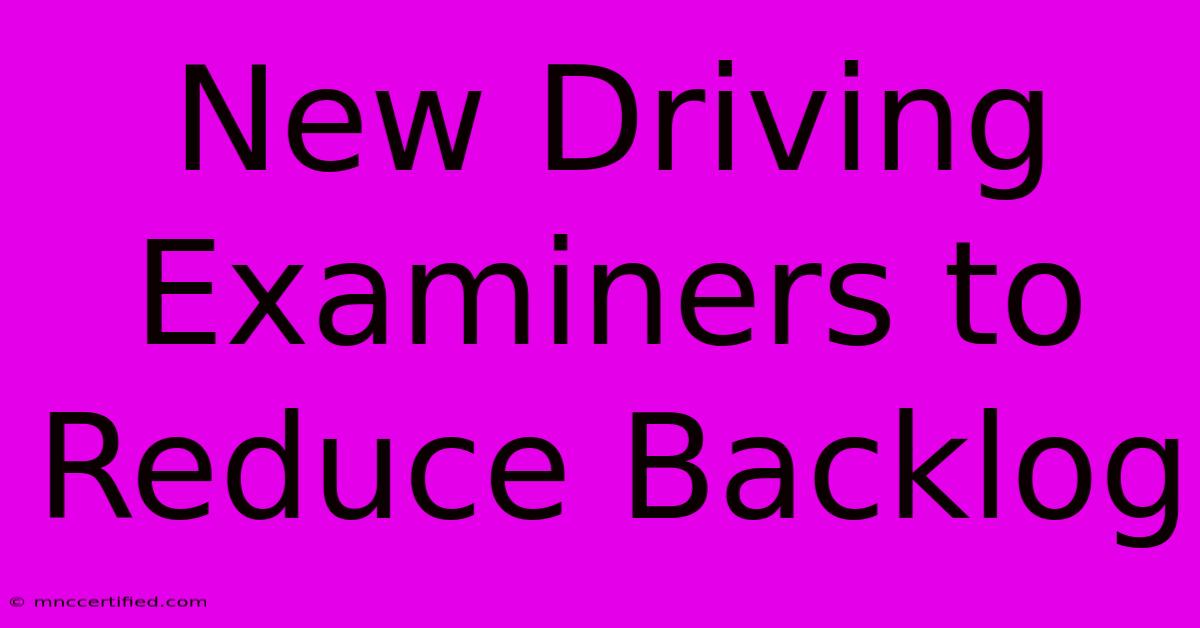New Driving Examiners To Reduce Backlog

Table of Contents
New Driving Examiners to Reduce Backlog: Easing the Wait for Your License
The wait for a driving test has become a significant hurdle for many aspiring drivers. Long delays, often stretching for months, are causing frustration and inconvenience. But there's hope on the horizon! Many jurisdictions are actively recruiting and training new driving examiners to tackle this growing backlog. This article explores the reasons behind the delays, the impact of recruiting new examiners, and what you can do to navigate this process more smoothly.
The Driving Test Backlog: A Nationwide Problem
The increase in driving test waiting times isn't a localized issue; it's a widespread problem affecting numerous states and countries. Several factors contribute to this frustrating situation:
- Increased Demand: More people are seeking driving licenses, driven by factors like population growth and increased mobility needs.
- Examiner Shortages: A lack of qualified and available driving examiners is a major bottleneck. Retirement, resignations, and insufficient recruitment efforts all play a part.
- Pandemic Aftereffects: The COVID-19 pandemic significantly disrupted driving test schedules, leading to a substantial backlog that continues to impact wait times.
- Increased Regulations: More stringent testing procedures and increased administrative burdens can also slow down the process.
The Impact of the Backlog
The backlog doesn't just inconvenience individuals; it has wider consequences:
- Economic Impact: Delays in obtaining a license can affect employment opportunities, particularly for jobs requiring driving.
- Social Impact: Limited access to driving restricts social mobility and independence, especially for young adults and those in rural areas.
- Safety Concerns: While experienced drivers may feel the impact more personally, the increase in unlicensed drivers on the road poses a wider safety concern.
The Solution: Recruiting New Driving Examiners
Many driving licensing authorities are proactively addressing the backlog by recruiting and training new driving examiners. This is a crucial step towards reducing wait times and improving the overall efficiency of the driving test system.
The Recruitment Process: What's Involved?
Becoming a driving examiner typically involves:
- Rigorous Training: Extensive training is provided, covering both theoretical and practical aspects of driving assessment.
- Experience Requirements: Prior driving experience and a clean driving record are essential prerequisites.
- Personality and Skills: Successful candidates will need excellent communication skills, strong observation skills, and the ability to remain calm and professional under pressure.
The Positive Impact of Increased Examiner Numbers
The influx of new examiners is expected to significantly alleviate the backlog by:
- Increasing Testing Capacity: More examiners mean more driving tests can be conducted daily, thus shortening wait times.
- Improved Efficiency: A larger pool of examiners allows for better scheduling flexibility and optimized resource allocation.
- Reduced Wait Times: The most significant benefit is the anticipated decrease in waiting times for driving tests.
What You Can Do to Prepare
While waiting for your test date, focus on these steps:
- Book Your Test Early: Plan ahead and book your driving test as early as possible.
- Practice Regularly: Consistent driving practice is crucial to ensure you are well-prepared for the test.
- Stay Informed: Check the driving licensing authority's website regularly for updates and changes.
- Maintain Patience: The system is working to reduce the backlog, but patience is still key.
Conclusion: A Brighter Future for Aspiring Drivers
The recruitment of new driving examiners represents a significant step towards resolving the persistent driving test backlog. While the process may take time, the increased capacity and efficiency will ultimately benefit all aspiring drivers. By staying informed, preparing adequately, and maintaining patience, you can successfully navigate this process and achieve your driving license goals.

Thank you for visiting our website wich cover about New Driving Examiners To Reduce Backlog. We hope the information provided has been useful to you. Feel free to contact us if you have any questions or need further assistance. See you next time and dont miss to bookmark.
Featured Posts
-
Carabao Cup Arsenal Defeats Palace 3 2
Dec 19, 2024
-
Fatal Honolulu Plane Crash Pilots Killed
Dec 19, 2024
-
Family Support Wiggins And His Kids
Dec 19, 2024
-
Walker Trumps Bahamas Ambassador Choice
Dec 19, 2024
-
Dog Saved Host Rescued Thames
Dec 19, 2024